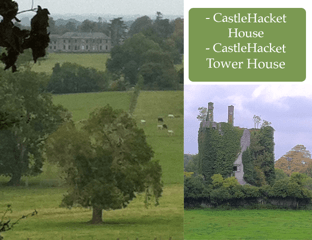Castle Hackett facts for kids
|
Caisleán an Haicéadaigh
|
|
 |
|
| Location | County Galway, Ireland |
|---|---|
| Part of | Ancient Gaelic Kingdom of Maigh Seola |
| Height | 168 metres (551 ft) (Castlehacket hill (Knockma)) |
| History | |
| Abandoned | 18th century |
Castlehacket is an old tower house from the 1200s. It sits at the bottom of Knockma hill, about 10 kilometers (6 miles) southwest of Tuam in County Galway, Ireland. A tower house is a type of strong, tall stone building that was common in Ireland.
Contents
Exploring Castlehacket's Past
Who Built Castlehacket?
The original tower house was built by the Hacketts. They were a family of Normans, people who came from Normandy in France and settled in Ireland a long time ago. They built many castles and strongholds across the country.
The Kirwan Family's Connection
Later, in the 1400s, another important family called the Kirwans moved to Castlehacket. The Kirwans were one of the "Tribes of Galway." This was a name for 14 powerful merchant families who lived in Galway City and the surrounding area. They were very influential in trade and local life.
In the mid-1600s, a specific part of the Kirwan family, led by Sir John Kirwan, made Castlehacket their main home.
From Old Castle to New House
The original tower house was left empty in the 1700s. The Kirwan family then built a new, large three-story house nearby, also called Castlehacket. This new house was damaged in 1923 during a time of conflict in Ireland. However, it was rebuilt and is still standing today.
Fairy Tales and Castlehacket
Castlehacket is also famous because it's mentioned in old Irish stories! The famous Irish writer William Butler Yeats wrote about the Hacketts of Castlehacket in his book Fairy and Folk Tales of the Irish Peasantry (1888).
Yeats wrote that some families were thought to have special connections with fairies. He said that the Hacketts of Castlehacket were believed to have a fairy as one of their ancestors. This shows how old legends and folklore are often connected to real places and families in Ireland.

